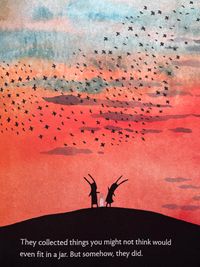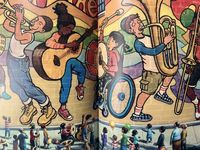"Dream the world as it ought to be. Don't let anybody, anybody convince you this is the way the world is and therefore must be. It must be the way it ought to be."
In this time of worry and doubt, of caged minds and fractured hearts, felled trees and tired poets, what is there to love? To hope for? What is left of dreams?
"Even as we hurt, we hoped, even as we tired, we tried," poet Amanda Gorman reminded us in her poetic embrace of a wounded nation.
We've braved the belly of the beast.
We've learned that quiet isn't always peace,
and the norms and notions of what "just is."
It's always justice. And yet the dawn is ours before we knew it.
Somehow, we do it.
Somehow, we've weathered and witnessed
A nation that isn't broken but simply unfinished.
From Amanda Gorman's "The Hill We Climb"
Through this inaugural gift, Gorman shows that hope is born of resilience and dreams. Resilience for the reality that meets us and dreams of the reality that could be.
Or rather, that ought to be.
"Dream the world as it ought to be," declared Toni Morrison (February 18, 1931 - August 5, 2019), with the same heart-opening magic that summoned stillness as a response to chaos. In a speech to the graduating class of 1988 at Sarah Lawrence College, five years before she became the first Black woman to win the Nobel Prize for Literature, Morrison urged her eager audience to think beyond easy goals or trite aspirations.
The future, responsibility, goodness - I'd love talking about all that, but not the last one: happiness. I'm not sure if it's all it's cracked up to be. I know of course, that its pursuit (if not its achievement) is a legal one amended into the Constitution. I know that whole industries are designed to help you identify, attain, and feel it. I'd like to substitute something else for its search. I want to talk about dreaming.
 Martin Luther King's incarceration photo for protesting in Birmingham, Alabama, 1963. "I am in Birmingham because injustice is here," wrote King in his letter of grief and conviction.
Martin Luther King's incarceration photo for protesting in Birmingham, Alabama, 1963. "I am in Birmingham because injustice is here," wrote King in his letter of grief and conviction.Morrison's usage of the word "dream" reuses a distinguished term from the vernacular of Martin Luther King, Jr., whose "I Have a Dream Speech" ignited the world's purpose and conviction hardly three decades earlier. King was a mentor of Morrison, and although the two never met, his inspiration weighed heavy on the novelist's shoulders. "The world is better, finer because he lived in it." Morrison wrote in her informal eulogy to the slain civil rights leader.
The word "dream" is powerful in the context of Morrison's speech:
Dream the world as it ought to be, imagine what it would feel like not to be living in a world loaded with zero-life weapons manned by people willing to lose them, develop them, or store them for power, or data, but never for your life and never for mine. What would it be like to live in a world where the solution of serious, learned people to practically every big problem was not to kill somebody? Narcotics trade? Whom shall we kill or lock up? Disease? Whom shall we let die or lock up? Self-rule by a neighboring (or even distant) country? Whom shall we slaughter? Famine? What is an acceptable death rate? Unemployment? Homelessness? What is the tolerable starvation rate?
 "They collected things together." From Deborah Marcero's tale of friendship and holding on to things that cannot be held.
"They collected things together." From Deborah Marcero's tale of friendship and holding on to things that cannot be held.Morrison uses Dr. King's word "dream" to evoke the concept of civil justice and suggests a "redream" to reinvigorate our pursuit of it.
Enemies, races, and nations can live together. Even I in the last forty years have seen deadly national enemies become warm, mutually supporting friends, and four national friends become enemies. And it doesn't take forty years to witness it. Anybody over eight years old has witnessed the expedient, commercial, almost whimsical nature of national friendships.
[...]
That determined commitment must be redreamed, rethought, and reactivated by me and you. Otherwise, as nationalism and racism solidify, as coasts and villages become and remain sources of turmoil and dispute, as eagles and doves alike hover over the remaining sources of raw wealth on this earth, as guns and gold and cocaine topple grain, technology, and medicine to win first place in world trade, we will end up with a world not worth sharing or dreaming about.
American poet Mary Ruefle once described imagination as a sort of invisible everything that nurtures and warms our minds. Imagination is a stormy ether in which we exist, whether we see it or not. Morrison similarly suggests we inhabit this imaginational dream space and direct it towards a reality that ought to be.
It is possible to live without defending property or surrendering it, but we will never live that way unless our thinking is shot through with dreams. And it is necessary now because if you don't educate the unschooled with the very best you have, don't give them the help, the courtesy, the respect you had in becoming educated, then they will educate themselves, and the things they will teach and the things they will learn will destabilize all that you know. And by education, I do not mean hobbling the mind, but liberating it; by education, I do not mean passing on monologues but engaging in dialogues. Listening, assuming sometimes that I have a history, a language, a view, an idea, a specificity. Assuming that what I know may be useful, may enhance what you know, may extend or complete it. My memory is as necessary to yours as your memory is to mine. Before we look for a "usable past" we ought to know all of the past. Before we start "reclaiming a legacy" we ought to know exactly what that legacy is-all of it and where it came from. In the business of education, there are no minorities, only minor thinking. For if education requires tuition but no meaning, if it is to be about nothing other than careers, if it is to be about nothing other than defining and husbanding beauty or isolating goods and making sure enrichment is the privilege of the few, then it can be stopped in the sixth grade, or the sixth century when it had been mastered. The rest is reinforcement.
I've read before that when Patrisse Cullors identified the early mission of the Black Lives Matter movement in America, she described it as "rooted in grief and rage but pointed towards vision and dreams." If dreams are imagination plus hope, perhaps visions are the dream with the details ironed out. Dreams are carried by a precious few pallbearers who elevate our consciousness repeatedly to a reality that ought to be.
With this vital benediction given in 1988 but published in her essay collection The Source of Self-Regard, Morrison adds her consciousness to the tradition of blessings and inspiration for soon-to-be graduates. This literary style also gave us novelist George Saunders's gentle lesson on the legacy of kindness and Joseph Brodsky's warning of the evil that follows unchallenged fear. Brodsky's warning echoes Morrison's argument that fear creates our capacity to 'other' which perpetuates humanity as it is, not as it ought to be.


